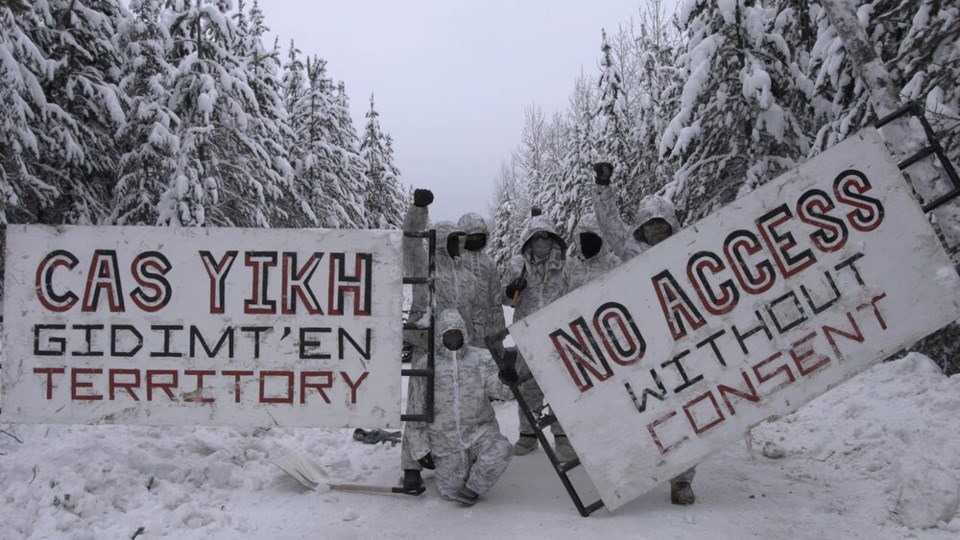A B.C. First Nation opposed to a $6-billion gas pipeline cutting through their territory is calling on the United Nations to intervene amid “ongoing human rights violations” and the “militarization” of its lands.
In a Feb. 7 submission to the office of the UN’s High Commissioner for Human Rights (OHCHR), Wet’suwet’en hereditary Dinï ze’ (Chief) Woos, Frank Alec, urges the United Nations to conduct a field visit to their territory.
“Reconciliation will not come at the barrel of a gun,” states the submission, which was backed by the Union of British Columbia Indian Chiefs, several legal experts and over two dozen rights and environmental groups.
The authors are asking for the submission to be assessed at a September 2022 session of the OHCHR Expert Mechanism on the Rights of Indigenous Peoples. The UN human rights body was not immediately available for comment.
In 2020, Wet’suwet’en hereditary chiefs issued an eviction notice to Coastal GasLink, sparking Canada-wide protests and several rail blockades in support of the First Nation.
Over the past three years, police have arrested over 70 people along the pipeline right-of-way, including land defenders, legal observers and journalists under a court-ordered civil injunction.
United Nations bodies have spoken out on the pipeline project before.
“Alarmed” by an escalating threat of violence against First Nations, in 2019, the UN Committee on the Elimination of Racial Discrimination called on Canada to immediately cease construction of the Coastal GasLink pipeline, among other energy projects, until Indigenous peoples could be fully consulted.
Since then, the submission to the UN claims the B.C. and Canadian governments have used the RCMP Community Industry Response Group (RCMP-CIRG) detachment — armed with semi-automatic weapons — to “intimidate, surveil, and harass Wet’suwet’en people” on a daily basis.
“The RCMP-CIRG unit has an explicit mandate to protect corporate resource and energy sectors in Canada, which has, in effect, led to the criminalization of lawful Indigenous advocacy through militarized police enforcement of court-ordered civil injunctions,” states the submission.
The Wet’sewet’en opponents point to a 2019 study from the Yellowhead Institute — an Indigenous-led think tank — which found that out of almost 100 injunctions, 76 per cent of those filed by corporations against First Nations were granted; by contrast, 81 per cent of injunctions filed by First Nations against corporations were denied. When it came to injunctions filed by First Nations against government, 82 per cent were found to have been denied.
“Injunctions are used to grant access to police to patrol Indigenous territory, criminalize Indigenous title holders, and allow companies to carry out operations regardless of whether the question of Indigenous consent has been answered,” states the submission to the UN.
Passing through traditional Wet’suwet’en territory, the pipeline is the biggest of its kind in Canada. When completed, it will connect gas fields in northeast B.C., with a massive processing facility on the coast.
Opposition to the project has gained momentum among climate activists as well. Critics say the pipeline and LNG terminal in Kitimat will make it impossible for B.C. to reach its emission reduction targets; the B.C. government maintains the massive gas project is tailored for a world shifting toward renewable energy, where “global markets are expected to favour lower-carbon natural gas producers.”
The latest round of arrests began in the fall of 2021, when land defenders set up a blockade on the shores of the Morice (Wedzin Kwa) River southwest of Houston, B.C.
At the time, Coastal GasLink said it was using a micro-tunnel method of drilling that “does not disturb the stream or the bed and banks of the river.”
Wet’suwet’en opponents say they don’t trust a technology that hasn’t been proven to contain gas decades into the future.
In October, Chief Woos said he and other Wet’suwet’en land defenders have been locked out from proper consultation; a spokesperson from the Ministry of Energy, Mines and Low Carbon Innovation, on the other hand, said Coastal GasLink has been engaging with Indigenous nations since 2012.
The Ministry of Indigenous Relations and Reconciliation leads ongoing consultation with the Officer of the Wet’suwet’en.
The B.C. government was not immediately available to comment on the submission to the United Nations.
Coastal GasLink says nearly half the planned 670-kilometre-long pipeline has been completed. However, as of Jan. 24, the company says it had not installed any pipe along a 78-kilometre stretch of the project near the contested Morice River.
Correction: An earlier version of this story erroneously indicated the BC Environmental Assessment Office was in ongoing consultation with Indigenous leaders. In fact, the EAO's First Nations consultation process wrapped up with the issuance of the environmental assessment certificate in late 2014. It continues to monitor the construction of the pipeline and has issued a number of enforcement actions for non-compliance.




